Local psychotherapist reveals dangers of misusing the term ‘narcissist’ in relationships
As social media explodes with Gen Z’s obsession with narcissism, a leading psychotherapist urges young Aussies to stop using the therapy term. Here’s why.
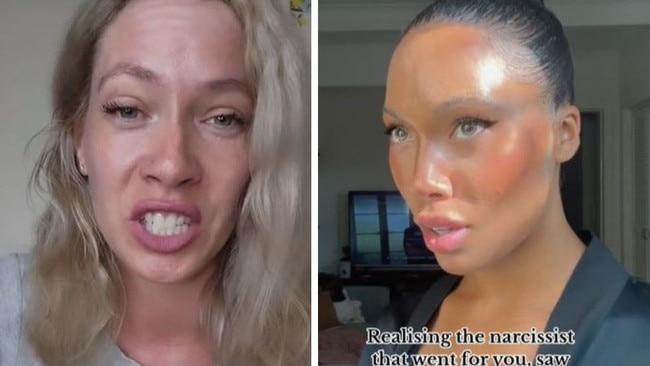
Lifestyle
Don't miss out on the headlines from Lifestyle. Followed categories will be added to My News.
It doesn’t take long to stumble upon a video on social media of a young Australian waxing lyrical about narcissism.
In one TikTok watched by 52.5k users and liked by nearly 3k, a woman passionately describes being “discarded” by a narcissist in an explainer entitled “Understanding why the narcissist hates you by the end of the relationship”.
In another, a glamorously dolled-up content creator gazes coquettishly off-camera while lip syncing to a film quote, captioned: “Realising the narcissist that went for you, saw traits in you they wanted but didn’t have”.
One more follows the tried-and-tested format whereby a creator starts with “I’m in a relationship with a narcissist” before describing commonalities of dealing with the personality disorder.
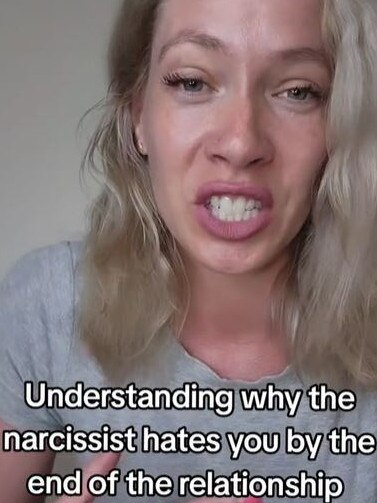
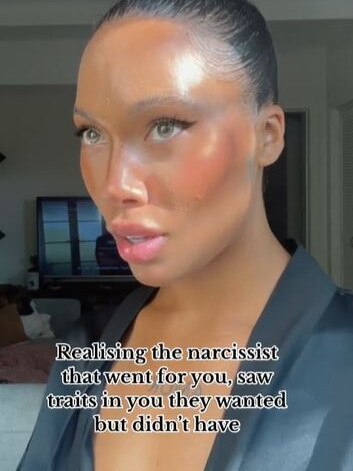
Over on Instagram, the hashtag “narcissist” has over two million mentions to date, with “warning signs,” “common traits,” and “tips” dotting the several reels on offer.
“Narcissist” is the Gen Z catchcall of 2024, and leading relationship therapist Nicholas Purcell says the term is increasingly cropping up in his appointments.
In fact, Mr Purcell admitted nothing makes him squirm quite like a patient misdiagnosing a narcissist in a session.
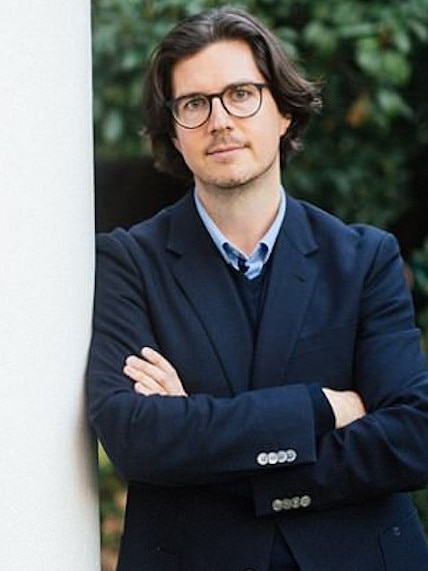
But hidden in the confidence of clients freely labelling others with the personality disorder, there’s often an alarming truth.
In many cases, Mr Purcell said, the client is actually displaying what could be classified as their own narcissistic behaviour.
“When one partner refers to their partner as a narcissist I see it usually as the result of pain, frustration, a lack of understanding and care,” Mr Purcell explained.
“Ironically, the person who believes they are the victim is doing to their partner exactly what they don’t like receiving themselves.
“It is better to explore your suspicions privately with a therapist to determine if you are right and what to do next,” he advised.
The overuse of “narcissist” comes as part of a wider trend of terms ordinarily confined to psychological settings making their way into the mainstream vernacular.
And it’s not the only gripe Mr Purcell has happened upon, with “co-dependency,” “gaslighting,” and “trauma” among the misused therapy buzzwords often in need of unpicking.
Dubbed therapy-speak, a new vocabulary has been introduced to the masses through the explosion of therapy-related content on TikTok and Instagram — a welcome sign of mental health awareness and a shared willingness to seek help.
Oftentimes, however, the definitions become muddled in the process — leaving the professionals to clear up the confusion.
For Mr Purcell, it’s “bittersweet” when people come into his rooms armed with a psychological term.
“I’m glad people are starting to develop their awareness of important psychological ideas but often I find that a little bit of information has now caused some harm which needs to be undone,” he said.
“It’s not uncommon for people to build up incorrect or limiting stories around their own self-diagnosis or worse, to label others incorrectly and insensitively and inflict more harm into the relationship.”

He likened the movement to GPs being increasingly faced with pre-diagnoses from ‘Dr Google’.
“I think it’s definitely helpful in the same way I imagine a generation or two ago people’s growing awareness around dangerous physical symptoms like breast lumps and irregular skin moles definitely brought a few incorrect self-diagnoses into GP offices, but also brought some correct diagnosis which ended up saving lives,” he said.
“People being more aware of relationship dynamics and psychological issues is a great thing, as long as they understand that not every mole is cancerous.”
Outside a therapy setting, Mr Purcell said, deploying such terms in an argument can fast track a serious rift with a partner.
“If a psychological term, not fully understood, is used to label your partner it might begin a conversation, but unless carefully raised it is more likely to be perceived as criticism, judgement or somehow finger pointing or shaming. None of which are helpful.”
Last year, actor Jonah Hill was widely lashed over viral texts in which he was accused of emotionally manipulating former girlfriend Sarah Brady with therapy lingo.
His ex, professional surfer Brady, shared the messages on Instagram, accusing him of emotional abuse.
One alleged screenshot showed Hill informing Brady of what he considers unacceptable behaviours for a romantic partner including “posting pictures of yourself in a bathing suit,” “surfing with men” and modelling.

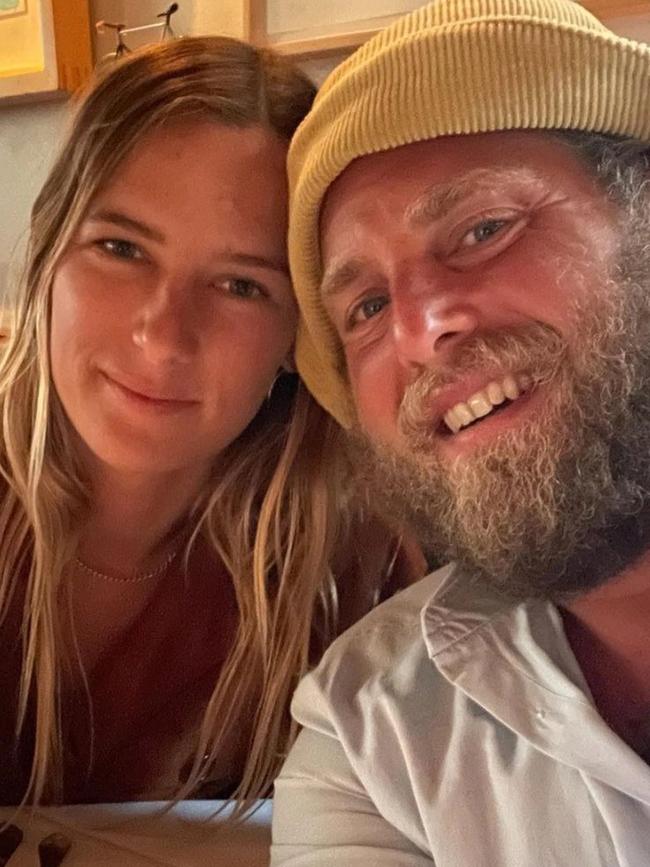
“If these things bring you to a place of happiness I support it and there will be no hard feelings. These are my boundaries for romantic partnership,” Hill reportedly wrote in the exchange.
It was a widespread example of such terminology being misused to the point of weaponisation.
“If your intention is to raise a topic as part of a concern (for yourself, or your partner) then that’s part of healthy communication, while holding onto the possibility you might be wrong or need to adjust your views,” Mr Purcell explained with reference to the saga.
“If however you are using a therapeutic idea to control, pressure, guilt or manipulate your partner, that’s unhealthy communication.
“You need to be honest with yourself about what your intention is in raising the topic.”
So what is a narcissist?
“It exists on a spectrum however, where a narcissistic person can be slightly narcissistic all the way up to extremely narcissistic at which point it is a diagnosable disorder called Narcissistic Personality Disorder (NPD).”
How do you know if you are dating a narcissist?
According to Mr Purcell: “The easiest way to know if you are dating a narcissist is that you will usually feel undervalued, ignored and confused about your relationship.”
He continued, “Your needs will not be the priority of the relationship. Of course you may also be the narcissist.
“If you often feel dismissed, misled about your own perceptions, subjected to unpredictable emotional shifts, isolated, emotionally depleted, or like you’re constantly tiptoeing around your partner’s moods, these could be indicators that you’re in a relationship with a narcissist.”
It can often be difficult to navigate a relationship with one, though not impossible if signs are recognised and dealt with early.
“The self-centred nature of a narcissist, combined with a lack of empathy, can lead to behaviours and relationship dynamics that are hurtful and often destructive,” Mr Purcell explained, adding that the key to a successful relationship is “increasing your willingness to leave”.
“It seems counterintuitive but you need to feel strong and willing to walk away in order to be able to set boundaries, consequences and have difficult conversations.
“I would also consider that many people with narcissistic traits may have suffered childhood trauma and need care as long as you assert your requirement that they seek to heal their own pain in therapy.”
He concluded that “it’s not your job to fix them,” imploring people to “seek therapy” should they find themselves struggling.




